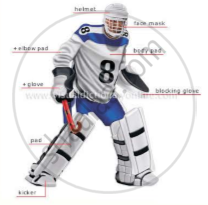Advertisements
Advertisements
प्रश्न
ind the word that refers to the snake’s movements in the grass.
उत्तर
Wiggle
APPEARS IN
संबंधित प्रश्न
Answer of these question in a short paragraph (30–40 words).
Name the various places and causes for which Evelyn performs.
Answer these question in one or two words or in short phrase.
Name the two temples the author visited in Kathmandu.
“Toto was a pretty monkey.” In what sense is Toto pretty?
Based on your reading of the story answer the following question by choosing the correct option:
With reference to Hooper, the author says, “Every thing was going for him”. What does it imply?
Form pairs - one student will read the text for 'Hockey', and the second student will read the text for 'Football'.
Hockey

The game starts when the umpire blows his whistle for the opening pass-back. The passback is made at the centre of the field to start the game (also after half- time and after each goal is scored). The ball, which may be pushed or hit, must not be directed over the centre line. All players of the opposing team must stand at least 5 yard from the ball and all players of both teams, other than the player making the pass-back must be in their own half of the field.
There are two umpires to control the game and to administer the rules. These umpires are the sole judges of the game. The umpires are responsible for keeping time for the duration of the game.


In front of each goal is an area known as the penalty area. This is a rectangular area, 40.2m wide and extending 16. Sm into the field where the goalkeeper operates.
A standard adult football match consists of two periods of 45 minutes each, known as halves. Each half runs continuously, meaning that the clock is not stopped when the ball is out of play. There is usually a 15-minute half-time break between halves. The end of the match is known as full-time. Anytime during the match, a team can substitute upto three players maximum.
The game is controlled by a referee who is the official timekeeper for the match, and may make an allowance for time lost through substitutions, injured players requiring attention, or other stoppages. There are also two linesmen who keep guard of the touchlines or sidelines, signalling when the ball crosses the boundary lines. The referee alone signals the end of the match.
Handling the ball deliberately, pushing or tripping an opponent, or hitting a player from behind are examples of fouls, punishable by a direct free kick or penalty kick depending on where the offence occurred. Other fouls are punishable by an indirect free kick.
The referee may punish a player's or substitute's misconduct by a caution (yellow card) or sending-off (red card). A player is given a yellow card is said to have been 'booked'.
• Red - Serious misconduct resulting in ejection from the game. If a player has been sent off, no substitute can be brought in his place.
Old Kaspar took it from the boy,
Who stood expectant by;
And then the old man shook his head,
And,with a natural sigh,
"Tis some poor fellow's skull," said he,
"Who fell in the great victory.
"I find them in the garden,
For there's many here about;
And often when I go to plough,
The ploughshare turns them out!
For many thousand men,"said he,
"Were slain in that great victory."
Read the lines given above and answer the question that follow.
Explain with reference to context.
Mr. Oliver, an Anglo-Indian teacher, was returning to his school late one night on the outskirts of the hill station of Shimla. The school was conducted on English public school lines and the boys – most of them from well-to-do Indian families – wore blazers, caps and ties. “Life” magazine, in a feature on India, had once called this school the Eton of the East.
Mr. Oliver had been teaching in this school for several years. He’s no longer there. The Shimla Bazaar, with its cinemas and restaurants, was about two miles from the school; and Mr. Oliver, a bachelor, usually strolled into the town in the evening returning after dark, when he would take short cut through a pine forest.
Read the extract given below and answer the question that follow.
When did Mr Oliver return from the town?
After washing from his hands and face the dust and soil of work, Joe left the kitchen, and went to the little bedroom. A pair of large bright eyes looked up at him from the snowy bed; looked at him tenderly, gratefully, pleadingly. How his heart swelled in his bosom! With what a quicker motion came the heart-beats! Joe sat down, and now, for the first time, examining the thin free carefully under the lamp light, saw that it was an attractive face, and full of a childish sweetness which suffering had not been able to obliterate.
“Your name is Maggie?” he said, as he sat down and took her soft little hand in his.
“Yes, sir.” Her voice struck a chord that quivered in a low strain of music.
“Have you been sick long?”
“Yes, sir.” What a sweet patience was in her tone!
“Has the doctor been to see you?”
“He used to come”
“But not lately?”
“No, sir.”
Read the extract given below and answer the questions that follow.
How did Maggie look at Joe when he entered her room?
Sibia sprang.
From boulder to boulder she came leaping like a rock goat. Sometimes it had seemed difficult to cross these stones, especially the big gap in the middle where the river coursed through like a bulge of glass. But now she came on wings, choosing her footing in midair without even thinking about it, and in one moment she was beside the shrieking woman. In the boiling bloody water, the face of the crocodile, fastened round her leg, was tugging to and fro, and smiling. His eyes rolled on to Sibia. One slap of the tail could kill her. He struck. Up shot the water, twenty feet, and fell like a silver chain. Again! The rock jumped under the blow. But in the daily heroism of the jungle, as common as a thorn tree, Sibia did not hesitate. She aimed at the reptile’s eyes. With all the force of her little body, she drove the hayfork at the eyes, and one prong went in—right in— while its pair scratched past on the horny cheek. The crocodile reared up in convulsion, till half his lizard body was out of the river, the tail and nose nearly meeting over his stony back. Then he crashed back, exploding the water, and in an uproar of bloody foam he disappeared. He would die. Not yet, but presently, though his death would not be known for days; not till his stomach, blown with gas, floated him. Then perhaps he would be found upside down among the logs at the timber boom, with pus in his eye. Sibia got arms round the fainting woman, and somehow dragged her from the water.
Read the extract given below and answer the question that follow.
What would happen to the crocodile?
Why did he buy a young goat?
Read the following sentences.
(a) If she knows we have a cat, Paati will leave the house.
(b) She won’t be so upset if she knows about the poor beggar with sores on his feet.
(c) If the chappals do fit, will you really not mind? Notice that each sentence consists of two parts. The first part begins with ‘if’. It is known as if-clause.
Rewrite each of the following pairs of sentences as a single sentence. Use ‘if’ at the beginning of the sentence
Don’t tease the dog. It’ll bite you
What surprised Mr. Purcell one day?
What were the notable qualities of the shepherd?
What was Vijay Singh’s weakness? Which awkward situation did it push him into?
How did the ghost make a plan to trick Vijay Singh finally?
Word in the box given below indicates a large number of… For example, ‘a herd of cows’ refers to many cows.
Complete the following phrase with a suitable word from the box.
a _________________ of ships
What do you learn in the lesson about camels?
Complete the following sentences from memory choosing a phrase from those given in brackets.
Uncle told me that the shopkeeper had made ____________
Answer the following question:
How many prizes did the boy win? What were they?
Study the following phrases and their meanings. Use them appropriately to complete the sentences that follow.
The police are …………… the matter thoroughly.
